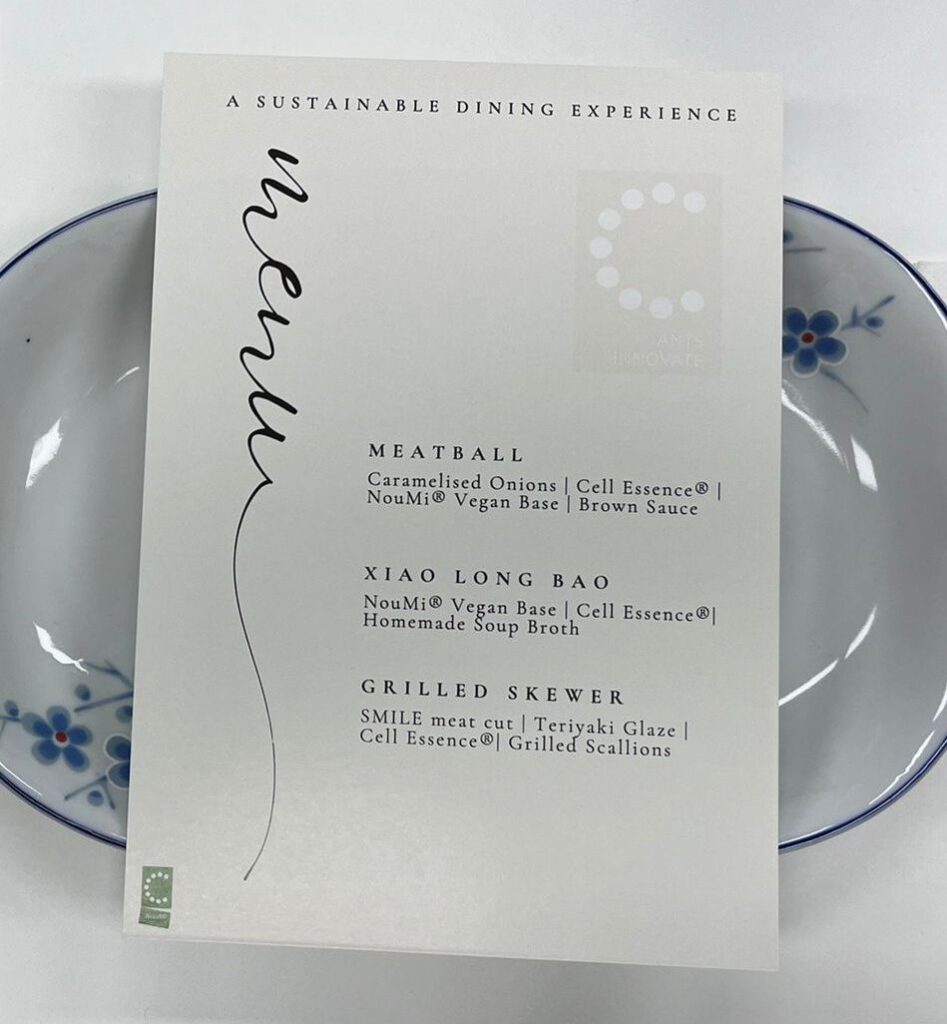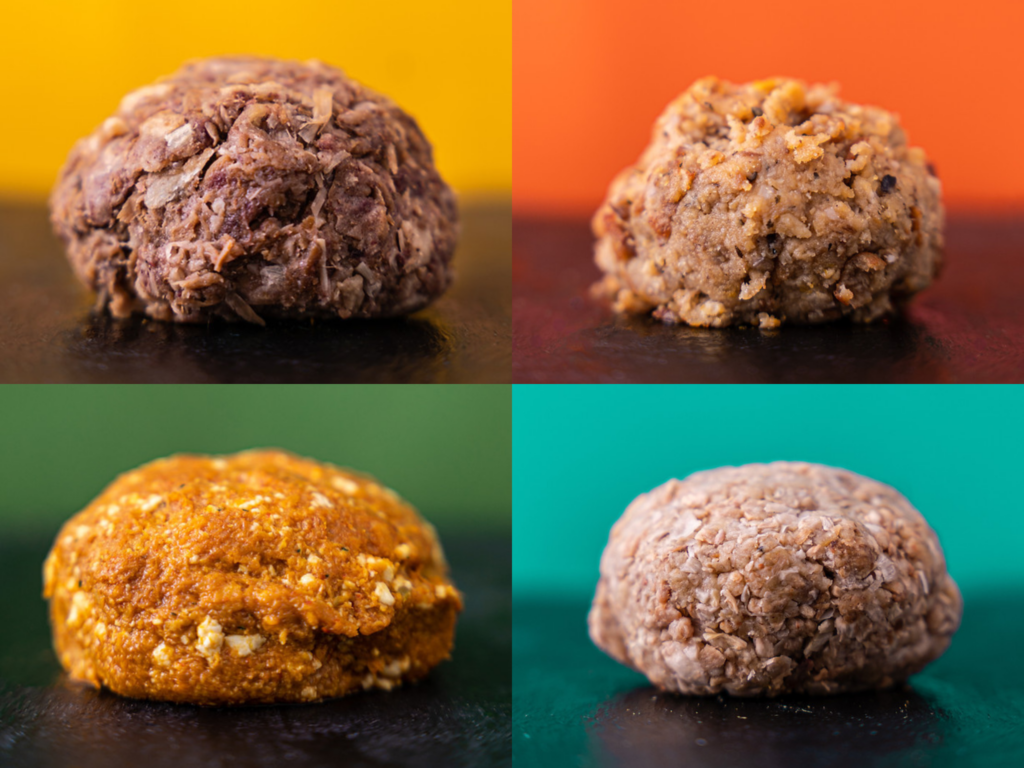Cell Essence: Singapore Cultivated Meat Startup Ants Innovate Holds Tasting Event for Hybrid Meat Ingredient
5 Mins Read
Singaporean startup Ants Innovate debuted a cultivated pork ingredient in hybrid meat dishes at a private tasting in the city-state.
Singapore is once again at the forefront of food tech innovation. Residents can already buy cultivated meat in a supermarket, while high-end restaurants continue to showcase its potential in a dining setting.
And this week, industry members got a taste of three new dishes using a new kind of ingredient for hybrid meats (a combination of cultivated animal cells and plant-based ingredients).
Local startup Ants Innovate showcased Cell Essence, a cultivated pork oil for hybrid meats, as part of three dishes at a private tasting. It is part of the company’s line of functional ingredients for the alternative protein industry, and was mixed with products from its plant-based meat brand NouMi.
The cultivated porcine oil was part of IKEA-style meatballs, Shanghai-style soup dumplings (xiaolongbao), and teriyaki grilled skewers. The latter featured another of Ants Innovate’s functional ingredients, a lean meat cut using its Scalable Micro-Imprinted Lapis Expansion (or SMILE) tech.
A few drops are all that’s needed

Ants Innovate is an alumnus of the state-owned Agency for Science, Technology, and Research (A*STAR), and was founded by Hanry Yu and Ong Shuian in 2020. The startup calls itself an “industry enabler and a translator of technology to products”, and aims to supply functional ingredients for cultivated and plant-based protein manufacturers to make premium whole-cut meats.
The company is working on a range of functional hybrid meat ingredients to hit the taste, texture and affordability touchpoints, which includes a scaleable micro-imprinting and stacking technology for planet-friendly meat cuts, as explained by the Good Food Institute (GFI) APAC.
Cell Essence is described as an ingredient that “emulates the rich, savoury essence of pork”, and has a major impact on the sensory aspects of hybrid meats even in small concentrations. The technology extracts these attributes from animal cells and helps the startup “control the meaty aroma, fibrous base or natural meaty colouring” of the products.
“This is a hybrid cultivated porcine oil that emulates the rich, savoury essence of pork,” explained Calisa Lim, senior project manager at trade body APAC-SCA, who was at the event. Writing on LinkedIn, she said she was particularly “blown away by the smell and taste” of the meat skewers.
“The small percentage of cells (<3%) was enough to deliver on the sweet, salty and umami flavour that conventional pork has,” remarked Lim.
“The Xiao Long Bao, which featured Ants Innovate’s plant-based NouMi vegan base and cultivated porcine Cell Essence, was an explosion of flavour. Delectable and persuasive,” GFI APAC managing director Mirte Gosker, who also attended the event, told Green Queen.
“The other dishes had room for improvement, but the cultivated pork flavouring showed clear promise. More culinary exploration will be needed to find the best potential applications,” she added.
The commercial potential of hybrid meat

Ants Innovate is among several startups working on cultivated meat ingredients. Silicon Valley startup Mission Barns is making cultivated pork fat, Dutch player Upstream Foods is working on cultivated salmon fat, and fellow Singaporean company ImpacFat is developing cultivated fish fat. South Korea’s Simple Planet, meanwhile, has created a cultivated meat powder.
Ants Innovate – whose name takes inspiration from the Ants and Lions story – has an automaton instrument that uses process and design engineering to seamlessly transform ingredients like Cell Essence into end products. It has established various cell lines and opened a lab and pilot plant at Bedok Food City.
It launched NouMi in 2022, offering plant-based meat products in the form of baos, spring rolls, curry puffs and dumplings. It has also been working with strategic partners in supply chain and distribution to commercialise its functional ingredients.
Most cultivated meats that have been sold so far are hybrid meats, as the industry continues to scale and lower costs. “The chances of being able to economically produce 100% cultivated products that can compete on price with commoditised meat are slim to none in the next 10+ years,” Heather Courtney, general partner at Alwyn Capital, told Green Queen in December.
“in the short term, it’s likely the only way to make cultivated commercially feasible,” she added. “Hybrid products will allow the cultivated market the chance to build and become normalised with consumers, while also – importantly – generating the revenues and business necessary to keep dollars flowing into the space, so scale can be further achieved.”
“The biggest takeaway of the event was that Ants Innovate believes hybrid products are more than just a stepping stone in the journey to scale up fully cultivated meat,” Gosker said.
“Rather, CTO Shengyong Ng made clear that he believes hybrid products are here to stay and that there is a consumer market that will be drawn to products that use small amounts of cultivated ingredients to take plant-based meat to the next level. A means of achieving taste parity, which is a non-negotiable factor for consumers, while keeping products affordable. If this week’s soup dumplings are any indication, he may be onto something.”
Ants Innovate – which has applied for regulatory approval in Singapore – addresses the cost question on its website, saying: “We have low cost as a key design goal and have simplified the manufacturing process and ingredient list, as well as the cell and food production strategies. We use cells for their meaty flavours so our premium quality products will be priced competitively with conventional meat.”
This story was updated to include insight from the Good Food Institute APAC’s Mirte Gosker.



